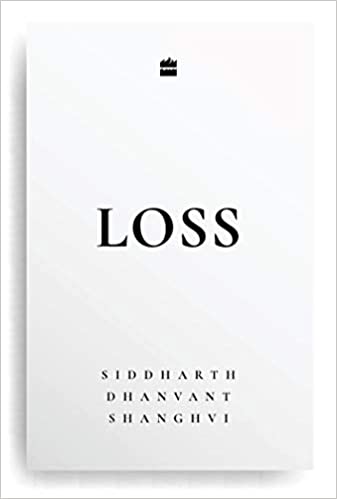Is it possible to write poetically about loss through death? It is possible to chronicle in words what it means to lose someone you love? Maybe it is. Once time has been benevolent and given the survivor the luxury of distance, one may look at loss differently. Maybe when one has passed the stages of grief and looks back in retrospect, it is possible to see loss with a new eye. And maybe then, as Shanghvi writes in his book, Loss, “Grief is not a record of what has been lost but who has been loved,”.
Loss by Siddharth Dhanvant Shanghvi (Harper Collins Publishers India) seeks to explore the theme of Loss. Released against the background of the pandemic adds one more layer to this book which gently makes us ‘fall into’ ponderings about loss. “The best answers are the ones we fall into, like love” he writes. Faced with grief that has accumulated over the years following three deeply personal losses- that of his parents and a beloved pet, he reminiscences on the theme of loss.

And as he tells us this tale of death, he objectively reflects upon some crucial questions. His mother suffered deep physical pain in the years before she passed away. Pain spared his father, but then, he slowly crumbled in cognitive faculties. What would have been a ‘better’ death? And what about the deep bonds shared with pets? “For all the ways they humanize us, dogs commit a service that borders on alchemy,” he says, as he remembers happy moments spent with his pet. He muses on many questions as he ponders on death through the lens of loss of loved ones.
The reader senses that he has very objectively looked at loss through the prism of his experiences. There is profound sensitivity that pervades the words, but it is not self-indulgent at all. The words and the text rise to a level where they find resonance with the human experience. This is a book that all readers will connect to.
As one reads on, one looks at the varied hues and nuances of loss. How important it is to ‘show up’ in person to mark a loss. How grudges melt. How death is an equalizer, the great equalizer. How we forgive. How we craft memories. More importantly, how we feel when we lose someone dear to us. “When we lose an intimate, two deaths occur. The first is the formal physical death of the person. The other death is of the person we were around them,” he writes.
It is not an easy task to write about loss. There are some places that even language cannot reach. How can one articulate loss? Words may not always suffice. But then, what does? It is challenging to describe loss as one will be often ‘at a loss for words’. But still, in my opinion, the greatest achievement of this book is the use of words to actually bring out the different tones of loss.
The book is divided into three sections each dedicated to one person- his father, his pet and lastly, his mother. Once we come to the third section, Padmini, where he talks about his mother, there is a sudden change in pace. What was a calm and wonderfully strung together narrative on grief soon fastens its pace. Like a shooting star the shining ‘sizzle’ comes and you get to witness a spectacle of a life lived with love and laughter despite travails, before it burns out. There is humour interwoven in this section. Humour saves the spirit in the most troubled of times. The warm anecdotes about this mother literally infuse the pages with warmth.
Before I picked up the book, I felt that a book on loss would be depressing. I felt hesitant to read it in the pandemic when we were faced with images of loss every single day. But, I was wrong. The book could well be used as a form of bibliotherapy. While Shanghvi’s words and musings are soothing in themselves, he has liberally quoted from literary greats and that also adds an interesting angle to the book. The black and white photographs that appear within add another element of tenderness to the words.
This is a memoir narrative that has helped me make sense of the times. The work is soul-stirring and touches the essence of humanity within you. Loss gently uses the “wisdom of the backward glance” to talk about something truly universal, even though it starts off from something so personal. And even as it tells you what it is like to lose someone, it smoothly embraces you in a deep circle of humanity cementing this experience in our collective consciousness.




